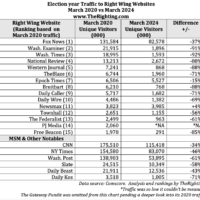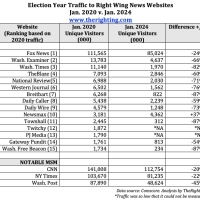
Investors Should Be Wary of Intriguing Right Wing Shopping Site
Right Wing Biz Watch
By David Lieberman, July 25, 2023
Wall Street seems intrigued by the notion that millions of right wing consumers are eager to shop in a so-called “parallel economy” of businesses that reflect their political and cultural priorities.
Investors enthusiastically greeted the stock market debut on Thursday of the first retailer designed to test that concept: PublicSq, which describes itself as a “pro-life, pro-family, pro-freedom” e-retail platform. It hopes to attract more than 35 million “active local shoppers” each week within four years to become “the largest, traditional-values-driven marketplace in the country.”
The company itself went on sale on Thursday when it merged with Colombier Acquisition Corp. – a special purpose acquisition company (SPAC). Its share price soared 117 percent by the end of the week. As of Monday, the company, now called PSQ Holdings, had a market cap of more than $364 million, which suggests it’s seen as almost as valuable as USA Today publisher Gannett.”
The deal gives PublicSq access to about $159 million that it says it will use to “enable and accelerate future growth initiatives.”
Founders believe they can strike gold by appealing to people like the ones who supported Donald Trump in 2020. They represent $7 trillion in buying power yet have “no products for them,” Colombier Chairman Omeed Malik, 42, said in a fireside chat with IPO Edge.
“If you’re a Christian, conservative, mother of three in the mid-west, can anyone mention one large multinational company that tries to market to them?” the contributing editor and minority owner of The Daily Caller added.
PublicSq is an intriguing concept, but a puzzling company – and investment.
Execs say they hope to win by offering a compelling and competitive product. Founder and CEO Michael Seifert says that “all we care about” is delivering “maximum value to our shareholders and our consumers.” And he boldly predicts that his company represents a “greater opportunity” than Etsy, which has a market value of about $12 billion.
But it’s hard to see how PublicSq gets there.
Seifert, who also controls a majority of the voting shares, is a 28-year-old Liberty University political science and international relations graduate with no experience running a retail company. He was head of marketing and PR at real estate and asset management firm Pacifica Enterprises before launching PublicSq.
The company acknowledges in its proxy that most of its senior managers “have no experience managing a publicly traded company.” As a result, they might not be prepared for their “significant regulatory oversight and reporting obligations under federal securities laws and continuous scrutiny of securities analysts, investors, and regulators.”
Marketing Play
But PublicSq is well-steeped in right-wing grievances. That suggests it’s primarily a marketing play – a bet on its ability to prod like-minded consumers to become so invested in the idea of shopping as a political act that they’ll overlook potential shortcomings including relatively high prices and limited selection.
PublicSq is eager to establish a beach head on the far right. It recently agreed to spend at least $1 million for ads on Tucker Carlson’s new video show on Twitter, CNBC reported.
Up to now PublicSq has focused its marketing on low-cost social media, word-of-mouth, and ads on right-wing outlets including video platform Rumble and podcasts including The Dan Bongino Show and Blaze shows featuring Allie Stuckey and Steve Deace.
Directors include former Vice President Mike Pence’s Chief of Staff Nick Ayres and former Arizona GOP Senate candidate Blake Masters – who was once COO of Peter Thiel’s investment company. Malick says the company politically has “direct connections to the [Donald] Trump side, the [Ron] DeSantis side, the Vivek [Ramaswamy] side and even to the Robert Kennedy Jr. side.”
PublicSq’s scant history with e-retail’s myriad pricing, privacy, payments, shipping, marketing, quality control, legal, and supply chain issues doesn’t appear to have hurt yet. It currently makes money by selling ads on its online directory of favored retailers.
Yet operational challenges will intensify soon as PublicSq transitions to become a one-stop shop for orders. It will take a transaction fee for purchases that will go to individual retailers to fulfill. They can join for free and pay to have their products listed toward the top of the company’s search results.
PublicSq also plans to sell its own product lines – sifting through consumer shopping data to find potentially lucrative openings. First up are disposable diapers and wipes from EveryLife, a company PublicSq bought in February in an all-stock deal.
“The people having kids en masse in this country are largely conservative people,” Seifert says. “It’s the Christian conservatives from the Midwest that are having six kids.”
Seifert says prices for the in-house products will be “very competitive” vs. those offered by rivals including Amazon and Etsy. EveryLife’s web site sells a package of 210 size 1 diapers for newborns as a one-time purchase with free shipping for about $80 – making them much costlier than the 198 similarly sized Pampers that Amazon sells for a little more than $54.
With its lack of scale and untested consumer appeal the tiny company will be hard-pressed to match the prices, speedy delivery times, and other benefits consumers often find at rivals including Amazon, Walmart, Target, and Etsy.
About 94% of U.S. online shoppers use Amazon, and 82% of them say that they are either “extremely” or “very” satisfied according to recent survey by investment firm Evercore ISI. Only 3% of the Amazon customers described themselves as dissatisfied.
No wonder PublicSq executives rarely miss an opportunity to characterize rivals as political actors. “If you think you should continue to patronize the Chinese Communist Party, then you should continue to shop at Amazon,” Malik said.
“Five Core Values”
The company says it will only offer products from retailers who subscribe to its “five core values.” They include a “commitment to freedom and truth,” celebration of families and “the sanctity of every life,” a belief that “small business members and the communities who support them are the backbone of our economy,” belief in “the greatness of the United States of America,” and that the constitution is “non-negotiable” – specifically that “government isn’t the source of our rights, so it can’t take them away.”
The noble-sounding values appear to translate into support for right wing culture war complaints and conspiracy theories.
For example, PublicSq’s “commitment to freedom and truth” doesn’t deter it from highlighting support from Donald Trump Jr., a 2020 election denier who has invested in the company. Seifert calls him “a dear friend who has helped tremendously in this journey.” Trump Jr. and Kimberly Guilfoyle joined PublicSq execs on Thursday to ring the opening bell at the New York Stock Exchange.
Executives also are quick to characterize efforts to promote decency and diversity in the harshest and most polarizing terms possible – seeing them as sinister plots to undermine traditional morals, not well-meaning policies they happen to oppose.
Seifert criticized companies that agreed to help employees travel to other states for abortions after the Supreme Court’s decision to overturn Roe vs. Wade, leading some states to clamp down on the procedures. The PublicSq CEO called the assistance “one of the most insulting things you can do” and “just a way of protecting their bottom line” to avoid having to pay for maternity leave.
By contrast, PublicSq gives employees $5,000 when they have or adopt a baby.
The CEO deemed Bud Lite’s recent promotions featuring transgender TikTok personality Dylan Mulvaney to be evidence of Anheuser-Busch’s desire to “indoctrinate the kids on issues of sexuality and gender.”
He similarly bristled at Target’s decision to sell LGBTQ-related merchandise to recognize June as Pride Month. He said the show of respect was an inappropriate attempt to talk to “kids about gender or sexuality” and victimized visitors who want “a wholesome shopping experience where they can know with blessed assurance that they aren’t going to be lectured.”
Malik says it’s a “marketing scam” when companies try to promote publicly useful environmental, social and governance policies or diversity and dignity.
The issue hits close to home for him, Bank of America fired him in 2018 after a female colleague charged him with sexual misconduct. He denied the charges, and later that year ended his defamation suit against the bank when it agreed to what Bloomberg called a “multimillion dollar sum” to settle the case.
The Emory Law School grad also had a taste of controversy when he worked for Jon Corzine – the former New Jersey senator and governor, and former CEO of Goldman Sachs – at his investment bank MF Capital. It became one of the largest bankruptcies in U.S. history in 2011 amid charges that MF Capital took excessive risks that it didn’t monitor.
PublicSq is playing things safe for now, for example by not providing financial forecasts. “Projections for nascent businesses and $1.50 may get you on the subway,” Malik says. He urges investors to focus instead on the potential growth of the “parallel economy,” the company’s management – and their politics.
“We are trying to democratize that [investment] experience and allow people to make their own decisions as to whether they want to support this transaction either for ideological or financial reasons, or both,” he says. “That’s ultimately what the decision will come down to.”
Right Wing Biz Watch is a ongoing series of articles examining the business and finances of right wing media. Its author, David Lieberman, covered the media business full time for 30 years at USA Today and other publications before joining The New School as an Associate Professor in its graduate Media Management program.
Interested in more news about right-wing media curated especially for mainstream audiences? Subscribe to our free daily newsletter.
PublicSq is well-steeped in right-wing grievances. That suggests it’s primarily a marketing play – a bet on its ability to prod like-minded consumers to become so invested in the idea of shopping as a political act that they’ll overlook potential shortcomings including relatively high prices and limited selection. (Image: PickPik)
























